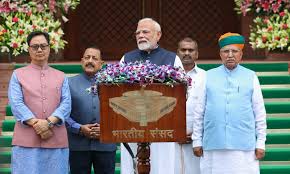As Monsoon session of Parliament begins, Modi’s message to Oppn: ‘our hearts must definitely be in the country’s interest’

The Monsoon Session of Parliament began on Monday with Prime Minister Narendra Modi delivering a strong message to the Opposition. He urged all parties to work with the nation’s interest in mind. His appeal came before the start of a session expected to be intense and closely watched.
Modi’s Message: Nation First, Politics Later
Speaking to the media outside Parliament, PM Modi said, “This session is important. People want debates, not disruptions. Our hearts must definitely be in the country’s interest.”
His remarks appeared aimed at the Opposition, which plans to raise several contentious issues. These include the NEET exam controversy, Manipur violence, and concerns about central agencies.
PM Modi didn’t name any specific leaders or parties. But his message was clear—cooperation matters more than confrontation.
New Lok Sabha, New Responsibilities
This Monsoon Session is the first major sitting of the new Lok Sabha. The BJP-led NDA has returned to power, but with a reduced majority. That makes the role of the Opposition stronger than before.
PM Modi acknowledged the change. He called for “meaningful dialogue” and asked all parties to think beyond politics. “Every minute in Parliament should focus on building the nation,” he said.
Opposition Prepares to Raise Burning Issues
The INDIA bloc has prepared a long list of topics. Congress, Trinamool, and other parties want to target the government on several fronts. These include the NEET paper leak, alleged misuse of power, and the law-and-order situation in some states.
Congress leader Mallikarjun Kharge said, “The government must answer for NEET irregularities. It affects lakhs of students.”
TMC MP Derek O’Brien added that Parliament should address the unrest in Manipur.
Despite these demands, PM Modi’s appeal suggests he wants a session marked by debate—not drama.
Big Legislative Agenda Ahead
This session is scheduled to run for 23 days. The government plans to introduce and pass over 30 bills. These bills cover topics like criminal law reforms, digital privacy, and electoral transparency.
A major focus will be on replacing colonial-era laws. The proposed Bharatiya Nyaya Sanhita, Bharatiya Nagarik Suraksha Sanhita, and Bharatiya Sakshya Bill aim to reform India’s justice system. Opposition leaders have already raised concerns about their scope and impact on civil liberties.
Call for Respectful Debate
PM Modi stressed the importance of dignity in democratic spaces. “Disagreements are part of democracy, but disruptions harm its spirit,” he said.
He encouraged new MPs to take part in discussions. He urged them to avoid walkouts and make their voices heard through facts and logic.
In the past, similar appeals have been made. But sessions often ended in chaos. This time, many hope for a better outcome.
Public Wants Results, Not Rhetoric
Citizens are closely watching how Parliament functions. A report by PRS Legislative Research shows that recent sessions were not productive. Many hours were lost due to disruptions.
People want lawmakers to debate issues, pass useful laws, and stay focused. Civil society leaders are also calling for responsible politics.
Constitutional expert Faizan Mustafa said on a TV panel, “This Parliament must prove that Indian democracy is mature. We need unity, not division.”
Will This Session Be Different?
The big question is whether Parliament can function smoothly. PM Modi has extended a hand of cooperation. The Opposition has its list of demands. Both sides must rise above partisanship to serve the public.
If they succeed, this session could mark a turning point. If not, it may just repeat the same cycle of noise and no progress.






